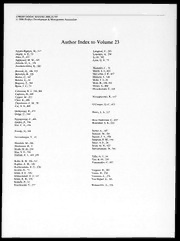
The Journal of Product Innovation Management 2006: Vol 23 Index PDF
Preview The Journal of Product Innovation Management 2006: Vol 23 Index
J PROD INNOV MANAG 2006;23:595 © 2006 Product Development & Management Association Author Index to Volume 23 Adams-Bigelow, M., 117 Langerak, F., 203 Akgiin, A. E., 73 Leiponen, A., 238 Allen, P., 437 Li, H., 342 Appleyard, M. M., 147 Lynn, G. S., 73 Athaide, G. A., 359 Atuahene-Gima, K., 342 Markides, C., 19 Barezak, G., 106, 512 Marsh, S. J., 422 Bernstein, B., 528 McCarthy, I. P., 437 Brown, C., 147 Mikkola, J., 128 Bstieler, L., 56 Mohr, J. J., 26 Buganza, T., 393 Moss, R., 106, 512 Byrne, J. C., 73 Moxey, S., 498 Mroczkowski, T., 528 Calantone, R. J., 330, 408 Capleton, H., 498 Capper, M., 215 Notargiacomo, R., 117 Chan, K., 408 Christensen, C. M., 39 O’Connor, G. C., 475 Cui, A. S., 408 DeMartino, R., 475 Peters, L. S., 117 Droge, C., 330 Easingwood, C., 498 Rose-Anderssen, C., 437 Emden, Z., 330 Rosenthal, S. R., 215 Enz, C. A., 556 Franke, N., 301 Sattler, L., 147 Schreier, M., 301 Govindarajan, V., 12 Siguaw, J. A., 556 Simpson, P. M., 556 Haenlein, M., 168 Slater, S. F., 26 Henderson, R., 5 Stock, G. N., 422 Hsieh, M.-H., 259 Subramaniam, M., 541 Hua, S. Y., 316 Hultink, E. J., 203, 259 Tellis, G. J., 34 Tsai, K.-H., 259 Kahn, K. B., 106, 512 Tsinopoulos, C., 437 Kaplan, A. M., 168 Karniouchina, E. V., 274 Keskin, H., 73 Verganti, R., 393 Khilji, S. E., 528 Verma, R., 274 Kleinschmidt, E. J., 117 Victorino, L., 274 Klink, R. R., 359 Von Hippel, E., 301 Kopalle, P., 12 Kuczmarski, T., 117 Wemmerlov, U.. 316 J PROD INNOV MANAG 2006;23:596 © 2006 Product Development & Management Association Subject Index to Volume 23 Prepared by the Editor, who solely is responsiblfeo r any error contained Product Development in this index. Antecedents and Consequences of Unlearning in New Product Devel- opment Teams (Ali E. Akgiin, Gary S. Lynn, and John C. Byrne), Forecasting 73-88. Life-Cycle Flexibility: How to Measure and Improve the Innovative PERSPECTIVE: Establishing an NPD Best Practices Framework Capability in Turbulent Environments (Tommaso Buganza and (Kenneth B. Kahn, Gloria Barczak, and Roberta Moss), Roberto Verganti), 393-407. 106-116. Rejoinders to Kahn et al. Article (Thomas D. Kuczmarski, Elko J. Kleinschmidt, Marjorie Adams-Bigelow, Richard Notargiacomo, Market Analysis and Lois S. Peters), 117-127. An International Investigation of Problem-Solving Performance in the Capturing the Degree of Modularity Embedded in Product Architec- Semiconductor Industry (Melissa M. Appleyard, Clair Brown, tures (Juliana H, Mikkola), 128-146. and Linda Sattler), 147-167. An Exploratory Investigation of NPD Practices in Nonprofit Organi- Product Change Intensity, Product Advantage, and Market Perfor- zations (Gloria Barczak, Kenneth B. Kahn, and Roberta Moss), mance: An Empirical Investigation of the PC Industry (Stella Y. 512-527. Hua and Urban Wemmerlév), 316-329. Bringing High Technology to Market: Successful Strategies Employed Strategy in the Worldwide Software Industry (Chris Easingwood, Steven Toward a Parsimonious Definition of Traditional and Electronic Mass Moxey, and Henry Capleton), 498-511. Customization (Andreas M. Kaplan and Michael Haenlein), 168-182. New Product Planning Managing Knowledge for Innovation: The Case of Business- The Relationships between Resource Configurations and Launch to-Business Services (Aija Leiponen), 238-258. Strategies in Taiwan’s IC Design Industry: An Exploratory Study Decomposing Product Innovativeness and Its Effects on New Product (Ming-Hung Hsieh, Kuen-Hung Tsai, and Erik Jan Hultink), Success (Roger J. Calantone, Kwong Chan, and Anna S. Cui), 259-273. 408-421. New Product Development as a Complex Adaptive System of Deci- sions (lan P. McCarthy, Christos Tsinopoulos, Peter Allen, and Organizing for Innovation Christen Rose-Anderssen), 437-456. Trust Formation in Collaborative New Product Development (Ludwig Bstieler), 56-72. Technology Innovation Collaborating for New Product Development: Selecting the Partner The Innovator’s Dilemma as a Problem of Organizational Competence with Maximum Potential to Create Value (Zeynep Emden, Roger (Rebecca Henderson), 5-11. J. Calantone, and Cornelia Dr6ége), 330-341. The Usefulness of Measuring Disruptiveness of Innovations Ex-Post in The Effects of Formal Controls on Supervisee Trust in the Manager in Making Ex-Ante Predictions (Vijay Govindarajan and Praveen New Product Selling: Evidence from Young and Inexperienced Kopalle), 12-18. Salespeople in China (Kwaku Atuahene-Gima and Haiyang Li), Disruptive Innovation: In Need of Better Theory (Costantinos Mar- 342-358. kides), 19-25. Creating Dynamic Capability: The Role of Intertemporal Integration, Successful Development and Commercialization of Technological Knowledge Retention, and Interpretation (Sarah J. Marsh and Innovation: Insights Based on Strategy Type (Stanley F. Slater Gregory N. Stock), 422-436. and Jakki J. Mohr), 26-33. Organizing for Radical Innovation: An Exploratory Study of the Disruptive Technology or Visionary Leadership? (Gerard J. Tellis), Structural Aspects of RI Management Systems in Large Estab- 34-38. lished Firms (Gina Colarelli O’Connor and Richard DeMartino), The Ongoing Process of Building a Theory of Description (Clayton M. 475-497. Christensen), 39-55. Integrating Cross-Border Knowledge for Transnational New Product The Impact of Product Innovativeness on the Link between Develop- Development (Mohan Subramaniam), 541-555. ment Speed and New Product Profitability (Fred Langerak and Erik Jan Hultink), 203-214. Product and Service Innovation: Ideas for Future Cross-Disciplinary Product Concept Research (Ekaterina V. Karniouchina, Liana Victorino, and Ethnographies in the Front End: Designing for Enhanced Customer Rohit Verma), 274-280. Experiences (Stephen R. Rosenthal and Mark Capper), 215-237. From Invention to Innovation: Toward Developing an Integrated Finding Commercially Attractive User Innovations: A Test of Lead- Innovation Model for Biotech Firms (Shaista E. Khilji, Tomacz User Theory (Nikolaus Franke, Eric von Hippel, and Martin Mroczkowski, and Boaz Bernstein), 528-540. Schreier), 301-315. Conceptualizing Innovation Orientation: A Framework for Study and An Illustration of Potential Sources of Concept Test Error (Richard R. Integration of Innovation Research (Judy A. Siguaw, Penny M. Klink and Gerard A. Athaide), 359-370. Simpson, and Cathy A. Enz), 556-574.
